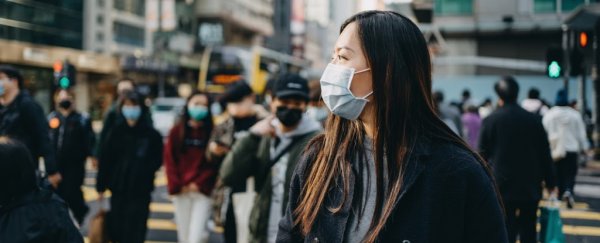Medical face masks have become the enduring image of the COVID-19 outbreak.
Chinese officials have urged citizens to don masks to curb the spread of the deadly disease, which has infected more than 31,000 people in China and killed more than 1,100.
But doctors say face masks aren't as effective as most people think – and there are better ways to protect yourself from the virus.
Wearing a mask isn't the best way to prevent coronavirus
The coronavirus outbreak has fuelled intense demand for face masks in China, where people often wait in line for hours at pharmacies in hopes of buying one.
As a response, factories around the world are working overtime to make more, and Chinese exports of the accessories have been temporarily halted so more locals can get their hands on them.
There's no vaccine yet to prevent the spread of coronavirus from person to person, and many think that wearing a mask will be protect them.
But that's not necessarily the case, according to scientists and doctors studying the disease.
Surgical masks are typically more useful to people who are already sick because it prevents them from spreading an infection to others.
Standard surgical masks are designed to block large particles and droplets, not small virus particles, and they're typically loose-fitting with gaps around the nose, mouth, and chin. More robust respirator masks can be more effective at protecting against viruses but only if they are individually fitted to form a tight seal.
"Small infectious droplets cannot be filtered by the surgical masks," Hyo-Jick Choi, an assistant professor of chemical and materials engineering at the University of Alberta, told Business Insider Today.
"At the same time, the respirators and the surgical masks do not have the function to kill the virus, so when virus-carrying droplets sit on the surface of the masks and the respirators, they can survive minimum a few hours to a week."
That means wearing a mask with virus particles on it for too long could actually put you and others at risk.
In fact, the World Health Organisation prioritises several other safety measures over wearing masks, including washing your hands frequently, using and discarding tissues when you sneeze or cough, and maintaining a 3-foot (1 meter) distance from other people.
The WHO recommends wearing face masks only in combination with frequent handwashing and proper disposal.
But Choi believes he has found an effective mask – one that's coated in salt crystals that can not only trap small virus particles but also deactivate them entirely.
"I believe virus-deactivating filters can be a critical component of rapid response to the control and prevention of respiratory diseases during an epidemic and pandemic," he told "Business Insider Today."
Factories around the world are ramping up production of masks to keep up with demand
Meanwhile, medical-supply companies like 3M and Honeywell are ramping up production of surgical masks to keep up with surging demand.
Prestige Ameritech, a mask manufacturer from Texas, is among the US companies that have shipped orders to foreign governments as the coronavirus spreads to places like Hong Kong, Singapore, and Taiwan.
"I have thousands of emails from people in Asia," Mike Bowen, the executive vice president of the company, told The New York Times. "Last week I sent over a million masks to China. That's one thing I never predicted, that I'd be sending masks to China."
And Direct Relief, a California nonprofit that provides medical supplies during disasters, is sending air shipments of more than 300,000 masks to Chinese hospitals, according to The Wall Street Journal.
As China tightens its quarantine of Wuhan residents, the demand for face masks is unlikely to subside anytime soon, regardless of their effectiveness.
"There's little harm in it," Eric Toner, a scientist at Johns Hopkins Centre for Health Security, told Business Insider's Holly Secon. "But it's not likely to be very effective in preventing it."
This article was originally published by Business Insider.
More from Business Insider:
